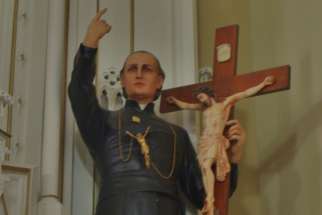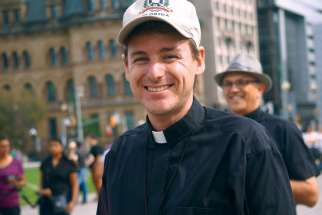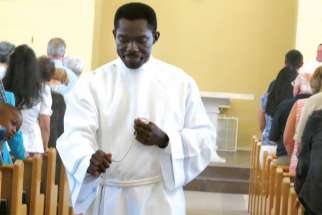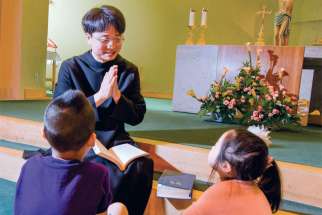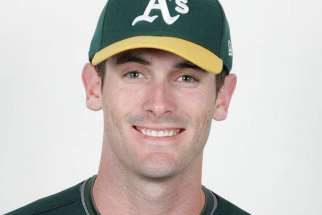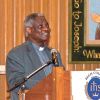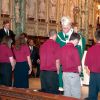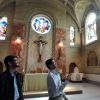Good News drenched in Precious Blood
If you’re going to preach in the modern world you need powerful language. The Missionaries of the Precious Blood have had that power incorporated into their very name for the last 200 years. From “blood brothers” to “Bloody Sunday,” “the blood of the Lamb” to “blood libel,” the 600 priests and brothers who call themselves Precious Bloods have the most arresting imagery in the entire story of human salvation as their calling card.
Call to Service
As part of the Year of Consecrated Life, The Catholic Register is proud to present its Call to Service special feature highlighting the stories of religious nuns and priests across Canada and internationally.
You can browse the articles below and see all the advertisements on the Digital Edition. The original pull-out section appeared in the April 26, 2015 issue.
Call to Service: Catholic Register 2015 Special Feature
- Christ remains at heart of religious life, by Michael Swan, The Catholic Register
- Congregation de Notre-Dame sisters reach out online to show value of consecrated life, by Jean Ko Din, The Catholic Register
- Nun's quest for renewal lands her in Ireland, by Evan Boudreau, The Catholic Register
- Nun has found her happy place, by Vanessa Santilli, Catholic Register Special
- In remote Arctic towns, radio connects Church with local Catholics, by Vanessa Santilli, Catholic Register Special
- The Grey Nuns played an integral role in Alberta's Church, by Lasha Morningstar, Canadian Catholic News
Catholics continue to answer the call
Family’s spiritual awakening opened the path to priesthood
OTTAWA - Fr. Bryan Sabourin, a member of the Companions of the Cross order, recalls a time when he was embarrassed to bring his friends home.
In Jesus I found the meaning of life
I was 17, and had just finished high school in Nigeria. The world had opened up to me with all its beauty, charm and possibilities. I had to consider what I would do with my life. I needed the best that the world could offer. I spent time with my friends. We talked about our future and the kind of profession we wanted.
Catholic Church can play role in conquering Korean divide
TORONTO - Going home to South Korea for Fr. Anselmo Park will mean getting back to evangelizing his countrymen in the name of peace.
Star athlete turns back on baseball for the priesthood
OAKLAND, CALIF. - Bishop Michael C. Barber was able to do what general manager Billy Beane could not: Call Grant Desme to Oakland.
Today’s Africa proof the old evangelization worked
TORONTO - The New Evangelization that anchors Pope Benedict XVI’s call for a Year of Faith looks a little different from an African perspective, Cardinal Peter Turkson told a capacity audience at the Regis College chapel in Toronto.
The Ghanaian cardinal who heads up the Pontifical Council for Justice and Peace delivered the Martin Royakers Lecture Sept. 26, speaking about “Vatican II: A Council of Justice and Peace.” He also spoke with The Catholic Register in an exclusive interview.
For African Catholics the New Evangelization is a challenge to form better leaders in the Church and society, and an invitation to deepen the commitment of all Christians to the body of Christ, Turkson said.
Since the Second Vatican Council the African Church has grown to a degree almost inconceivable to the Churches in North America and Europe, Turkson said. From 29 million Catholics in 1962 to 186 million today, Africa’s Catholic population has grown 541 per cent.
The old image of Africa as a mission land under the tutelage of European and North American priests and sisters is beginning to fade. Between 1962 and 2012 African- born priests have risen from just 15,000 to more than 40,000. Seminaries are bursting. There were 26,000 religious women from Africa in 1962, compared to 68,000 today.
Many Africans have become missionaries to underserved regions of Canada, the United States and Europe.
It seems that the old evangelization worked.
“We did teach people the catechism and we did baptize them,” Turkson told The Catholic Register.
But that doesn’t mean Africa doesn’t now need the New Evangelization — a concept first spoken about by Pope John Paul II at a meeting of the bishops of Latin America in Puebla, Mexico, in 1979.
Just as the majority of African Catholics trace their Catholic roots to the great ecumenical council of 1962-1965, the majority of African nations were released out of colonialism either just before or during Vatican II.
“The educated elite, the educated class that emerged in the emerging states, mostly was educated in mission schools,” pointed out Turkson.
Unfortunately they included corrupt politicians such as Zairian President Mobutu Sese Seko, who amassed a personal fortune of some $5 billion, and Robert Mugabe, still in power in Zimbabwe.
“That has caused several Church leaders in Africa to sit back and think, ‘What did we do wrong?’ ” said Turkson.
But it isn’t just the politicians and business leaders of the continent that worry African bishops. In Turkson’s native Ghana almost a quarter of the population is Pentecostal, compared to just 15 per cent who are Catholic. Many people opt for a simpler, more personal, more emotionally expressive brand of faith.
What’s missing in the merely intellectual and notional religion of Africa’s leaders and the purely personal religion of the poor is the social doctrine of the Church, Turkson said.
“But their social consciousness, what we now call the social doctrine of the Church, wasn’t taught much. That was missing. People became Christians but the transition — the fact they were Christian — did not impact much on their social lives. That is something we are now discovering,” he said.
Just recording baptisms won’t do any more. Nor will mere catechism lessons make Christians.
“That is not quite the experience of conversion,” he said. “The Evangelical movement is appealing more to the heart, with lively music, lively prayer, the power of the spiritual world.”
All of that is embedded in the Catholic way of living out the sacraments, but it has to be uncoveredand presented in new ways, said Turkson.
“We need to find a way of bringing it down to basically these needs — to people’s life situations,” he said. “All of that serves as vehicles of God’s grace.”
He believes Catholic parish life has to afford people more opportunities to bear witness and testify to their faith.
“The world is now looking for witnesses,” he said. “We don’t make it alive. We don’t make it come alive in such a way that it encourages them, motivates them, touches their lives in faith. It would be great if we fashioned a little space in our worship for moments like that.”
Synod to set vision for the new evangelization
The global Church is in Rome to talk about how it talks to the world. The topic is the new evangelization,meaning all the ways the Church presents Christ to the world and how we are all called to serve.
The Synod of Bishops on the New Evangelization for the Transmission of the Christian Faith is more than a distant talking shop for high Church officials. It also provides the keys to the Year of Faith which launched Oct. 11, the 50th anniversary of the Second Vatican Council.
It’s the 25th such synod since the close of Vatican II and runs Oct. 7 to 28.
There will be two English and two French bishops from Canada among the approximately 170 bishops chosen by bishops’ conferences around the the world. The Canadian Conference of Catholic Bishops elected to send Quebec City’s Archbishop Gerald Cyprien Lacroix, Antigonish Bishop Brian Dunn, St.-Hyacinthe Bishop Francois Lapierre and Nelson Bishop John Corriveau.
The voting members of the synod will also include 20 bishops from Eastern Catholic Churches, 25 bishops who work in the Vatican heading up various offices, 35 bishops named directly by the Pope and 10 representatives from religious orders chosen by the Union of Superiors General.
Regis College professor of theology Sr. Gill Goulding will be the Canadian among 49 theological experts assigned to assist the synod fathers and contribute to discussions. The theologians and thinkers don’t get to vote, but their contributions to discussions may substantially contribute to what the bishops vote on.
How the synod will be understood outside Vatican City may have a lot to do with another Canadian. Basilian Father Thomas Rosica, CEO of Salt + Light Catholic Media Foundation, will be the English-speaking press secretary for the duration of the synod.
Though there will be lots of talk about new media and the digital age, Fr. Steve Bossi doesn’t want the bishops to come back from Rome with a social media strategy or a new comfort level with smartphones.The new evangelization is about a lot more than technology or better media management, said the director of programs at Toronto’s Paulist Centre.
“They need to come back with a vision,” said Bossi. “They need to come back with a sense of what is the modern world and how does it function. Then, how do we speak our faith into that modern world?”
In the lineamenta or discussion paper for the synod prepared by Croatian Archbishop Nikola Eterovic, the Vatican identifies six ways the world has changed and made it more difficult to proclaim the Gospel in our times:
o “Profound secularism” has made it difficult for religion to be heard and understood. An overly secularized culture keeps people cocooned in self-interest. “Temptations to superficiality and self-centredness, arising from a predominating hedonistic and consumer-oriented mentality, arenot easily overcome,” said the lineamenta.
o Migration is pulling people out of their own cultural context and creating new cultures thathave few marks of permanence, “leaving little space for the great traditions of life, including thoseof religion.”
o Social communications have developed so rapidly the Church has been left wondering how toengage in the new global conversation. “The formation of a culture centred on passing novelties, thepresent moment and outward appearances, indeed a society which is incapable of remembering the past and with no sense of the future,” is an unwelcoming place for 2,000 years of tradition dedicated to a single transcendent reality.
o Economics has become as globalized as every other aspect of our lives. As the butterflies of globalization have emerged from the cocoons of national and local economies, markets have shed ethical constraints and forgotten their moral purposes.
o Science proposes a worldview that often seems as broad and hopeful as religion. “Science and technology are in danger of becoming today’s new idols.”
o Political life has changed massively since the fall of communism. Although the Church does not mourn the passing of an atheistic, materialist ideology, the triumph of markets, the emergence of violent and politicized appeals to religion in Asia and the Islamic world and the environmental crisis makes for a situation “frought with risks and new temptations of dominion and power.”
Eterovic’s six points seem like an overwhelmingly negative assessment of the world. It would be easy to incorrectly conclude that the new evangelization is about the Church standing in opposition to the modern age, retreating into an intellectual and emotional bunker constructed from comforting bits of its own history.
But the new evangelization is not about fear and loathing of the world, said Bossi.
“It’s part of our faith that we believe that the Holy Spirit moves through time and through human experience,” he said. “God has not abandoned us in this world and the Church doesn’t have to be out there somehow speaking against the modern world.”
Isaac Hecker, founder of Bossi’s Paulist order, would have recognized many of Eterovic’s challenges as his own in the United States of 150 years ago. Hecker was faced with a population of immigrant Catholics who had been knocked off the moorings of their traditional Catholic culture by the experience of migration. The 19th century was an age of wonders that made communication (telegraph) nearly instantaneous and travel(trains) rapid and cheap. Hecker responded by preaching and writing in the language of his times.
The Paulists today carry on their founder’s new evangelization with their own involvement in media and in adult education.
It’s not so much about which media carries the words as it is about the authenticity and honesty of the words, said Bossi. Attempts to carefully manage the media by sticking to an approved, prepared text are rarely persuasive in a culture that values honest, spontaneous responses.
“You don’t get that sense of speaking from the heart. And yet, what are people looking for?” asked Bossi. “They aren’t looking for data they can get into their head. They’re looking for someone who can speak to them at the level of human experience.”
The decree granting indulgences for the Year of Faith makes it clear Pope Benedict XVI has no intention of sending Catholics fleeing from the world.
“All the faithful, individually and in community, will be called to give open witness of their faith before others in the particular circumstances of daily life,” reads the Sept. 14 decree.
The Pope has also signaled that he views the new evangelization from an ecumenical perspective. On the personal invitation of Pope Benedict XVI, one of the first speakers at the synod on new evangelization will be the Anglican Communion’s scholarly leader Archbishop Rowan Williams. Williams was to address synod fathers Oct. 10.
“A new evangelization means that the Church must convincingly sustain her efforts at uniting all Christians in a common witness to the world of the prophetic and transforming power of the Gospel message,” reads Eterovic’s lineamenta.
In fact, the new evangelization does not begin with what the Church says to the world, or even how it says it. The starting point is what the Church is to the world and in the world.
“In the end, the expression new evangelization requires finding new approaches to evangelization so as ‘to be Church’ in today’s everchanging social and cultural situations,” reads the lineamenta.
As a theologian consulting with the bishops at the synod, it’s the existential hope of the Gospel as it is lived that Goulding wants to emphasize.
“In many ways it seems to me that the heart of the new evangelization lies in living radically the faith that we have,” she said.
Toronto students called to ‘ACCTS’
TORONTO - The Toronto Catholic District School Board, through its A Catholic Call To Service (ACCTS) program, is looking to expose students to the true meaning ofservice.
“It’s a program in which our students get an opportunity to witness, in action, their faith,” said Deb Gove, the board’s secondary resource person forreligious education. “It is a totally unbelievable experience for boththe students and the people (they help).”
ACCTS, which launches Oct. 17, will see 35 Catholic secondary schools across the city send 10 students into the downtown region to help out at a varietyof social assistance agencies. These agencies include shelters, missions and food distribution groups.
On the day of service, students meet and are divided into groups before heading off to the appropriate location. Everything is wrapped up around 7 p.m.following a liturgical service. But there is more to it than just a single day of service.
“It’s not just a day, it’s a taste of what service is like,” said Gove. “It’s life-long learning.”
Lasting about 10 hours, the day does not count towards the students’ compulsory 40 hours of community service for graduation in the Catholic system. The focusis on teaching students about the importance of helping others without any personal gain.
“If we’re just out there looking after each other and not looking after those who need it we’re not doing what Jesus asked us to,” said Gove.
“It’s important that we take care of the poor and vulnerable.” That’s a message which stuck with Raffi Degralstanian after participating in ACCTS last fall.
“I hadn’t actually had a good idea of what service was until I was actually there,” said the Grade 12 Brebeuf College School student. “It definitely opened my eyes to when people need service and how I should give it to them.”
Degralstanian was one of the students who helped clean up Mary’s House, a downtown women’s shelter, after it suffered significant damage from a fire.
The experience touched him so much that when the opportunity to participate in this year’s 15th anniversary program came, Degralstanian immediately wentonline to register.
“It was like wow, I did something here, I was able to contribute my physical being and apply it to this place and it made a difference,” said Degralstanian.
“Giving your sweat and being there physically doing something is much more meaningful than donating five or 10 bucks.”
When the group of 10, which included Degralstanian, returned to Brebeuf the following school day from their various assignments they instantly becamepivotal figures in establishing the school’s own Street Patrol program. Details of the school’s program, which is independent from ACCTS, are still beingdeveloped, but the objective is feeding the homeless at least once a month during the school year.
“It speaks a lot to the meaningful experience they receive on this given day,” said Robert Gregoris, Brebeuf chaplaincy team member.
“For a lot of them it is an eye opener. A lot of them don’t see the difficulties and the challenges that the human spirit goes through.” Although Gregoris said he understands the importance of the day’s message of unrewarded service he does think the students receive something in return — a closer connection with God.
“It’s a real tangible way where young people get to experience the message of Christ and the face of Christ,” said Gregoris.
“It gets to their heart, it gets to their soul.”
Marriage Encounter strengthens the relationship
TORONTO - It’s one thing to have a good marriage, it’s another thing to have a great one, and that’s what a Marriage Encounter weekend can offer.
“You really are disconnected from the world for a weekend and investing in your relationship,” said David Adams, co-county co-ordinator for the English Toronto district of Worldwide Marriage Encounter with his wife, Lucy. “Really the basis of the weekend is to help couples learn a communication technique called dialoguing.”
This is done by essentially sequestering a group of couples, in the case of the upcoming Nov. 2-4 weekend at Mississauga’s Four Points Sheraton, and having them discuss specific topics with their significant others.
Each topic is first discussed in front of the group of participating couples by one of the presenting couples who have already completed the regular week and a more intensive training version. These presentations last between 30 and 40 minutes.
Twelve topics of discussion are presented during the weekend after which all participants privately reflect on their personal feelings regarding the topic. These reflections are then shared with the respective spouses.
“It’s more than just the topic, it’s about being able to listen, to get the feelings behind the topic,” said David Adams.
“It’s really about understanding who you each are.”
Topics include defining the type of listener you are, determining the personality of your partner and sex.
“Each topic follows each other so beautifully and by the time you get to the end, which is the sacrament, it’s like this yearning to really almost make that new commitment to each other, that bigger commitment,” said Lucy Adams. “It just gives (couples) a whole program to experience other couples openly sharing their lives and vulnerabilities.”
But it doesn’t end on the Sunday. The group is encouraged to establish a sharing circle.
According to Lucy Adams, about 80 per cent of couples successfully establish these groups with a small percentage of those who do not returning for a second weekend.
These groups meet monthly and practice the dialogue technique. This strengthens the ability to communicate and in turn the marriage.
“It allows couples that were together, in a very condensed and simplified format, to continue that weekend,” said David Adams. “We’d like to see couples continue to be connected with the Worldwide Marriage Encounter community and keep it alive in their marriage.”
Worldwide Marriage Encounter, the facilitating organization of the weekends, began in Spain with Fr. Gabriel Calvo in 1961. By the end of 1967 Marriage Encounter weekends had begun in North America starting in New York. Worldwide Marriage Encounter is active in more than 90 countries, in a variety of languages and focus on different faiths, but all have a consistent format.
“There might be some regional subtleties but the whole format and the desire behind it are consistent,” said David Adams.
Although the weekends co-ordinated by the Adams are Roman Catholic based, inter-faith couples are still encouraged to come — David Adams was an Anglican when he attended in the spring of 1995 but has since converted to the Catholic faith.
For those interested in the November weekend, or one scheduled for April 19-21, call Cora or Mike Bryce at (905) 896-2958.
First NET team established in Quebec
OTTAWA - After 18 years of evangelizing youth across Canada, National Evangelization Teams (NET) Ministries has finally taken hold in Quebec.
Seven youth aged 18-20 will devote the next eight months of their lives to missionary work at Saint-Louis-de-France parish in Terrebonne, Que. There, they hope to bond with parishioners, who will billet them in their own homes, and lay the foundations for an active youth ministry while sharing the Good News and drawing people into a personal relationship with Christ.
“It is an amazing opportunity to be in Quebec and it is certainly missionary territory,” said Joe Vogel, executive director for NET.
NET Ministries already has several English-speaking youth missionary teams across Canada. Vogel explained that “Les equipes NET,” the French-speaking branch of NET, began several years ago as a travelling team which spent one to two weeks in various francophone communities. He likens the visits to planting a “seed” of faith, but in Terrebonne that seed will now be watered and given ample sunshine. The parish team will spend almost a year getting to know the community and its social reality, forming friendships, identifying the needs and wants of the faithful. It aims to organize a youth group, retreats, prayer events, anything to be effective in reaching people’s hearts for Christ. Essentially, the team is there to serve, responding wholeheartedly to the call for new evangelization, after a summer of training.
“We’re praying that it works and we are going to do the best that we can,” said Vogel. “Success would be witnessing the Gospel to young people and seeing lives changed.”
The community at Saint-Louisde-France was eagerly anticipating the NET team’s arrival this month. Micheline Chartrand, a lifetime parishioner, made the trip from Terrebonne to Ottawa on Sept. 29 for the NET Ministries’ Commissioning Mass, where Ottawa Archbishop Terrence Prendergast gave his blessing to all the young missionaries who will scatter across Canada this year.
“My hope is that by the end, we will have a group of youth who will be equipped to train other youth (to evangelize) and that they will experience peace and serenity in their hearts,” said Chartrand, adding that the French travelling team helped revive her faith during its visit more than a year ago.
None of the team members come from Quebec, but all are eager to explore the new mission territory and brush up on language skills at the same time.
“It’s a little intimidating, and humbling, but very exciting,” admits Kaylene McQuaid, originally from North Battleford, Sask. “I took French from Kindergarten until Grade 12, but I kind of took it for granted, and now I see there was definitely a reason why I took French. But being immersed in the culture will help as well.”
Charles Turner, a team member from Alberta, is honoured to live out the new evangelization in uncharted territory.
“We’re really coming out of our comfort zone,” he said.
In addition to Quebeckers, the NET missionaries will also be working directly with five missionary priests from France, members of the Community of Saint John, which was founded in 1975. The religious community of brothers began sending its priests to Quebec 16 years ago.
Fr. Marie Elie joined his brethren in Canada five years ago, with the task of finding the means to breathe life into the faith lives of the youth. Little by little, the priests have been creating opportunities for the youth of their parish to grow in faith and are preparing to send a group to the next World Youth Day. But NET seemed like the answer to their prayers, to give their ministry a boost.
“It is a beautiful opportunity to have young people who are equipped to encounter and engage young Quebeckers. The culture is a difficult one to penetrate, and a difficult one to connect with, and so we know that to succeed in the task we need help to show young Quebeckers that faith is not dead and the Gospel can be a beautiful part of their lives,” said Fr. Marie Elie.
NET missionary Pio Hartnett joins the Quebec team directly from Ireland. This year’s stay in Terrebonne will offer many challenges, but he still feels confident.
“The situation in Quebec reminds me of the situation in Ireland,” said Hartnett. “When I signed up for NET, I thought it would be amazing to be a part of this team... and so I am very excited.”
TORONTO - A lot of people don't know that God is Brazilian, but Scarboro Mission priest Fr. Ron Macdonell has had 26 years of working with indigenous people in the Amazon River basin to learn just how Brazilian God can be.
"Deus é Brasileiro," is a popular saying among Brazilians.
"To me it says that the Brazilians are very close to God and God is their creator. God made them," said Macdonell.
God made Brazilians even if it's hard to say what exactly a Brazilian is. Brazilian identity is a constant puzzle that goes much deeper than soccer and samba, bikinis and coffee.
For a missionary, the question of identity is worked out in faith.
"You can be Catholic in Brazil. You can be Chinese Catholic. You can be Nigerian Catholic. You have to look at what's cultural and what isn't," said Macdonell. "Looking at Brazil, Brazil is a mishmash of all the world's cultures."
Macdonell has lived most of the last 26 years among Macuxi native people in the rainforests of the Amazon, straddling the equator.
Macdonell doesn't think of himself as a missionary to Brazil. Rather, he is a missionary with the Macuxi people. He was living with the Macuxi in the northern Brazilian state of Roraima until the Scarboro Missions called him back this year to serve on its leadership council. Though now based in Toronto, Macdonell will return to his Macuxi community a couple of times a year for extended visits.
The 54-year-old identifies himself as a child of Vatican II, but traces his vocation back to pre-Vatican Council roots in Antigonish, N.S.
"This vision of justice was one feature of the pre-Vatican Church in Nova Scotia — the Antigonish Movement, the co-op credit union movement, Moses Coady and Fr. Jimmy Tomkins. I heard about all that from my parents," he said. "Then the second experience that was formative for me was the Antigonish diocesan priests who were working in Honduras as part of the Church's call to aid Latin America. I would hear about them."
A talent for languages also en- couraged Macdonell's vocation. He isn't just fluent in English and Portuguese. He has of course learned the indigenous languages of Roraima — Macuxi and Yanumami. Japanese was fun to learn. And when he did his PhD in linguistics it just seemed more intreresting to do it in French at Université de Laval in Quebec.
In the context of the Brazilian Church, Macdonell has a very clear sense of the Second Vatican Council as a living and breathing force.
"In Brazil we have a very strong component of the Church that works along social lines and the social Gospel," he said. "Any study of the catechism is not just a call to personal conversion and learning about the Catholic faith. It is also a call to missionary involvement in the local community."
Which means he's not the only missionary when he meets with his Macuxi parishioners. They're all missionaries. The priest's job is to give them the tools and the confidence to be missionaries in their own communities, even their own families.
"So the importance of leadership training is vital. And this is with people who do not have a lot of schooling — perhaps four years of school," he said. "A lot of our work — the sisters and the other priests I work with — is to form teams that will give spiritual training in how to read and interpret the Bible."
Macdonell sees the 19th-century missionaries as driven by sheer numbers of baptisms and the establishment of new parishes. Around the Second Vatican Council the emphasis shifted to institutions — clinics, hospitals, schools, labour centres.
But today's missionaries are focussed on formation so that people can really take ownership of their faith.
"It's sort of an invisible, unmeasurable mission," he said.
There will be no neat statistics that show how confident and wise parish leaders have become. But in regions where there are few priests spread out over huge territory with many inaccessible communities, where Mass is celebrated as little as two or three times per year, lay leadership is essential.
There's more to leading an indigenous Church in Brazil than liturgies and Bible study. People expect the Church to be close to them in their lives.
"We're working with people in poverty, so we're trying to analyse what are the sources of this poverty," said Macdonell.
Whether the issue is local drinking water or rampant alcoholism tearing apart families, groups Macdonell works with expect their religion to help them live a better life. Meetings that start with prayer quickly move on to deal with health, employment and social issues.
Brazil's national conference of Catholic bishops encourages and supports the connections between societal challenges and religion with annual fraternity campaigns during Lent and some 30 pastoral commissions that work on land rights, homelessness, workers' rights, women, ecology and more.
"There's already a structure that has been created within the Brazilian Church that calls people to this engagement, so that their personal faith is lived out in some way," Macdonell said.
As he settles back into life in Canada for a while, Macdonell is aware that at 54 he's one of the younger priests in the Scarboro Missions. He also knows the hope Scarboro Missions once placed in lay missionaries who make three-year commitments has been hard to achieve, with few people able to abandon jobs, families and mortgages.
But he doesn't believe we're living through a twilight for missionary vocations.
"The Church will always produce missionaries and we look to where they are to find them," he said.
"We see people coming to Canada from Asia, from Latin America, from Africa to be missionaries here among us. Our Church is more and more universal. That's where the catholicity comes in. It's a common language."
Brothers take two paths to same destination
TORONTO - Some brothers share a love of sports, others the same taste in music. But brothers Ryan and Favin Alemao share something different — a life path like no other.
Ryan, 27, and Favin, 24, are in formation for the priesthood at Toronto’s St. Augustine’s Seminary. And though both come from the same family, have had similar experiences and look incredibly alike — some even mistake them for twins — both reached the same point in very different ways.


